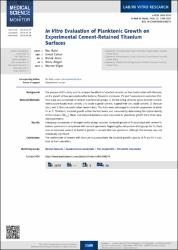In Vitro evaluation of planktonic growth on experimental cement-retained titanium surfaces

Göster/
Erişim
info:eu-repo/semantics/openAccessAttribution-NonCommercial-NoDerivs 3.0 Unportedhttps://creativecommons.org/licenses/by-nc-nd/3.0/Tarih
2016Üst veri
Tüm öğe kaydını gösterKünye
Balcı, N., Çakan, U., Aksu, B., Akgül, Ö. ve Ülger, N. (2016). In Vitro evaluation of planktonic growth on experimental cement-retained titanium surfaces. Medical Science Monitor, 22. 1180-1185. https://dx.doi.org/10.12659/MSM.898274Özet
Background: The purpose of this study was to compare the effects of selected cements, or their combination with titanium, on the growth of two periodontopathic bacteria: Prevotella intermedia (Pi) and Fusobacterium nucleatum (Fn). Material/Methods: This study was comprised of several experimental groups: 1) Dental luting cements (glass ionomer cement, methacrylate-based resin cement, zinc-oxide eugenol cement, eugenol-free zinc oxide cement; 2) titanium discs; and 3) titanium combination cement discs. The disks were submerged in bacterial suspensions of either Fn or Pi. Planktonic bacterial growth within the test media was measured by determining the optical density of the cultures (OD600). Mean and standard deviations were calculated for planktonic growth from three separate experiments. Results: Intergroup comparison of all experimental groups revealed increased growth of Pi associated with cement-titanium specimens in comparison with cement specimens. Regarding the comparison of all groups for Fn, there was an increased amount of bacterial growth in cement-titanium specimens although the increase was not statistically significant. Conclusions: The combination of cement with titanium may exacerbate the bacterial growth capacity of Pi and Fn in contrast to their sole effect.


















